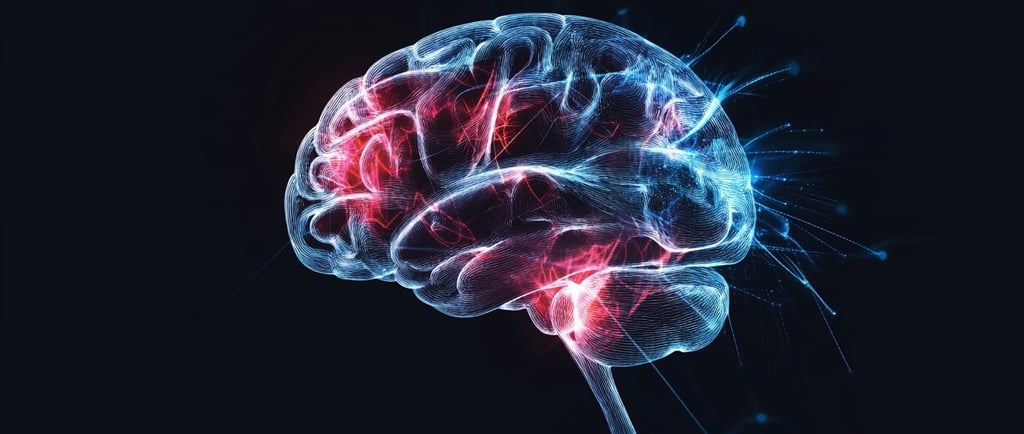How Hypnotherapy Works: Brainwaves, Emotion & Healing
Discover how hypnotherapy works with your brain’s natural rhythms to ease stress, access the subconscious, and support emotional healing through calm focus.
GENERAL
Marc Cooper
3/10/20253 min read


The Science Behind Hypnotherapy: A Look at the Subconscious Mind
By Marc Cooper | Marc Cooper Hypnosis
Have you ever been so absorbed in a book, film, or song that the world around you faded away?
That’s more than just focus. That’s your brain shifting gears.
And that shift is at the core of hypnotherapy.
🧠 The Unexpected Connection: Hypnotherapy and Neuroscience
Many people think of hypnosis as stage tricks or swinging watches. But hypnotherapy has a strong link to neuroscience—the study of how your brain works.
When you understand how your brain processes thoughts and emotions, hypnotherapy starts to make more sense. It’s not magic. It’s real, natural, and backed by science.
Let’s explore this connection in a simple and clear way, even if you’re not into science.
🌊 Brainwaves: Your Brain’s Natural Frequencies
Think of your brain like a radio. It works on different frequencies based on what you’re doing.
These frequencies are called brainwaves, and they shift with your mood and activity.
Beta waves: Active, alert, problem-solving. You use these during daily tasks.
Alpha waves: Calm and relaxed. These show up when you’re resting or daydreaming.
Theta waves: Deep relaxation. This is where hypnotherapy works best—between being awake and asleep.
Delta waves: Deep sleep state.
In hypnotherapy, your brain moves into theta waves. This relaxed state helps your mind access deep memories, emotions, and patterns.
This isn’t artificial. Your brain already knows how to enter this state—during meditation, daydreaming, or just zoning out. Hypnotherapy guides you there on purpose.
🧠 The Subconscious Mind: Where Real Change Happens
Your conscious mind plans, thinks, and analyzes. But it’s just a small part of your mind.
The subconscious mind is where long-term change happens. It holds your habits, emotions, beliefs, and memories.
You can tell yourself, “I’m calm. I’m confident.” But if your subconscious doesn’t believe it, nothing shifts.
That’s where hypnotherapy helps. It connects your conscious thoughts with your subconscious patterns. It gives your deeper mind a chance to accept change.
🎯 What Happens in the Brain During Hypnosis?
When you enter hypnosis, your brain starts to shift:
The default mode network (self-talk and overthinking) becomes quieter. This brings more calm and mental clarity.
The anterior cingulate cortex (focus and emotion control) becomes more active. You’re not asleep—you’re just deeply focused.
The amygdala (fear and stress) calms down. That’s why hypnotherapy often brings relief from anxiety and trauma.
You’re still in control. You’re fully aware. But your brain is in a more open and responsive state.
❤️ Emotional Relief Through Hypnotherapy
When emotions take over—anxiety, sadness, overwhelm—it’s your brain and body reacting together.
Hypnotherapy helps break that cycle. It guides your subconscious to let go of stress responses and replace them with calm reactions.
This doesn’t mean something is wrong with you. It means your mind needs a new path—one it already knows, but may have forgotten.
That’s why clients often say:
“I feel lighter.”
“The anxiety feels smaller now.”
“It’s like my nervous system finally exhaled.”
This isn’t guesswork. It’s a shift in your brain and nervous system, supported by science.
🧩 Suggestion: The Power of Receptive Thinking
Yes, hypnotherapy uses suggestion—but not in a controlling way.
I don’t plant thoughts in your mind. I help you reach a state where your subconscious is ready to accept better thoughts, beliefs, and responses.
You’re always in charge. You’re awake and aware. You can stop anytime.
But in that calm space, your inner mind is more willing to listen—and that’s where real change begins.
✨ You Already Know This Process
Here’s the truth: You’ve experienced light trance states many times before.
Driving a familiar road and forgetting the last few turns
Getting lost in a song or movie
Zoning out in a warm bath
Hypnotherapy uses that same natural state—but with purpose and guidance.
🕊️ After the Session: Your Mind Keeps Working
When a session ends, your subconscious keeps processing. Your brain continues to adjust, even if you don’t notice it right away.
Sometimes change is quick. Sometimes it unfolds gradually—like seeds growing in quiet soil.
But the change is real. It’s happening.
Final Thought: Science Meets Healing
People often ask me if hypnotherapy is real science. The answer is yes.
But here’s the deeper truth: Your brain is built for healing. Your subconscious is built for change.
Hypnotherapy opens the door. You walk through it.
Not because you’re broken. But because you’re human—and your mind knows how to restore balance when given the right support.
That’s not just science. That’s the human experience.
If you'd like a gentle place to begin, you might explore my Mental Detox hypnotherapy session — a calm reset for your mind and emotions.
--
If you’re curious about how hypnotherapy might help—whether it’s for stress, anxiety, grief, or simply feeling stuck—I’d love to hear from you. I’m here when you’re ready.
Marc Cooper
Address
Based in Los Angeles, CA
Online sessions available worldwide


